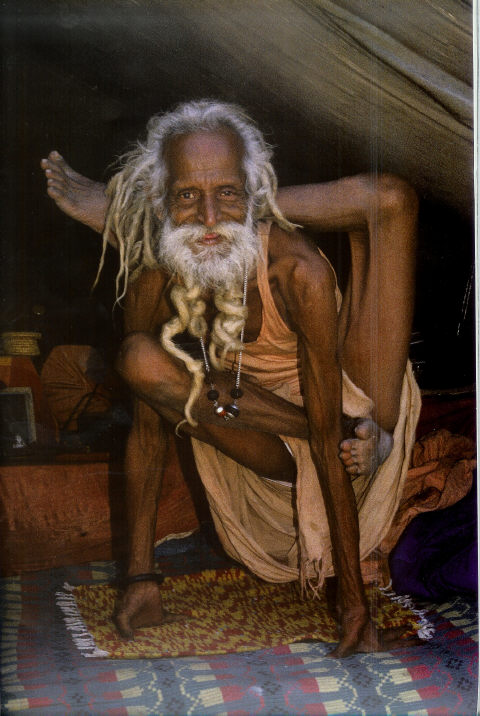 Presently there are many in the west who have a copy of the Bhagavad Gita and the Yoga Sutras, practice some form of Yoga and/or meditation, are vegetarian and believe in reincarnation and Karma. Yet they deny being affiliated with Hinduism or any other religious tradition because they think that all religions are corrupt, mundane and superfluous.
Presently there are many in the west who have a copy of the Bhagavad Gita and the Yoga Sutras, practice some form of Yoga and/or meditation, are vegetarian and believe in reincarnation and Karma. Yet they deny being affiliated with Hinduism or any other religious tradition because they think that all religions are corrupt, mundane and superfluous.
They think that if they admit to being a part of Hinduism, they will lose their “spiritual” status and/or moniker. The whole “being spiritual but not religious” thing is most often misunderstood by its own adherents. These self-described Yogis are essentially practicing Sanatana Dharma(Hinduism), while at the same time denying it. They walk like a duck, talk like a duck but insist on being a goose.
In a very real sense, a Yogi (a serious practitioner of Yoga), is practicing Hinduism. On the other hand, Yoga without its philosophical tradition and spiritual heritage is not really Yoga in the first place. The fact that Yoga is pursued by many non-Hindus is irrelevant to its validity as a Hindu practice. Hindu texts address the relation between the two quite often. The roots of Yoga, its scriptural origins, are Hindu. The stem of Yoga, its practice or sadhana, is Hindu. The flower of Yoga, its mystical union with the universal-divine, is Hindu. Yoga in its full glory and proper definition is fully Hindu.
 The question remains, where do we draw the line? Many Americans describe themselves as spiritual but not religious. This is often due to the fact that they’ve become disenchanted and dismayed with Christianity. But the Christian faith and the Hindu Dharma are like night and day; and most of the philosophies and practices these Yogis/spiritualists follow, have Hindu origins.
The question remains, where do we draw the line? Many Americans describe themselves as spiritual but not religious. This is often due to the fact that they’ve become disenchanted and dismayed with Christianity. But the Christian faith and the Hindu Dharma are like night and day; and most of the philosophies and practices these Yogis/spiritualists follow, have Hindu origins.
The Western Yoga instructor and student might state that anyone can do Yoga and that there really is no right or wrong way to do so. While anyone can practice Asana, not everyone who does is practicing Yoga in its traditional or comprehensive forms. If someone who has never seen, held or tasted an apple, is given the skin of an apple, he/she will not know the difference between the skin and a whole apple. If all he/she wants is the skin, then fine. It is however, only fair that he/she knows that all he/she has is the skin. In the same way, the Western Yoga student should be made aware of the fact that what they are practicing is but a fraction of the whole of Yoga.
As far as there being no right or wrong ways to practice various aspects of Yoga, there are. Yoga is a very technical and scientific methodology. If there are no right or wrong ways to practice, then what’s the need for a teacher in the first place? In fact, Yoga can be very powerful and like anything powerful, can be very dangerous if not done correctly in a protective environment with a competent and experienced teacher. The new student can easily injure him/hersef doing Asana, but the real danger lies in practicing Yoga’s other limbs without proper direction. These effect not only the physical body but also the psyche.
 In the west we have these Yoga systems, organizations, projects, conferences, festivals, federations, platforms, schools, missions, competitions, photo-shoots, immersions and other toys in the hands of spiritual neophytes who have made a game of Eastern spirituality. The Hindu might wonder what the future of Yoga is. He/she might wish for it to be represented with authenticity in order to preserve its integrity.As an American Hindu, I’m sorry to report that Yoga in the states has already become superficial, mundane and cliche’. Unfortunately, I suspect that India is not immune to modern materialism; and that Yoga even in her cultural realm has lost, to a lesser degree, it’s integrity and meaning. However, there is still a sea change between Yoga in the west and Yoga in the east.
In the west we have these Yoga systems, organizations, projects, conferences, festivals, federations, platforms, schools, missions, competitions, photo-shoots, immersions and other toys in the hands of spiritual neophytes who have made a game of Eastern spirituality. The Hindu might wonder what the future of Yoga is. He/she might wish for it to be represented with authenticity in order to preserve its integrity.As an American Hindu, I’m sorry to report that Yoga in the states has already become superficial, mundane and cliche’. Unfortunately, I suspect that India is not immune to modern materialism; and that Yoga even in her cultural realm has lost, to a lesser degree, it’s integrity and meaning. However, there is still a sea change between Yoga in the west and Yoga in the east.
While there are multitudes of house-holders in India who practice some form of Yoga as a part of their religion, they are not necessarily called “Yogis”. In India, a Yogi is a nomadic renunciate, a forest monk, a philosopher, sage, mystic and scholar. In the west, a Yogi is someone who goes to a stretching class once a week so that they may fit into his/her “skinny jeans”.
In the west, a Yogi is someone who goes to a stretching class once a week so that they may fit into his/her “skinny jeans”.
Many non-Hindus will ask, “why does any of this matter?” The following scenario shows one reason: What if you (the Western Yoga instructor) went to a middle school to teach an introduction to Yoga? Say there was an Indian Hindu in the class. She is new to the states. She has an accent. Her skin is darker than others. The other kids bully her and think she worships idols. Then it’s announced that a Yoga teacher is coming to teach a class. The Indian girl is elated. She thinks that now a true part of her culture and religious tradition will be represented and that maybe the other kids will now have some understanding and respect for her instead of calling her names.So you show up to teach and after your class you answer questions. The Indian girl is wondering why you haven’t said anything about where Yoga comes from. She raises her hand to ask you about it. “My parents have taught me that Yoga is a Hindu practice. Is that true?” And what do you say???
 Presently there are many in the west who have a copy of the Bhagavad Gita and the Yoga Sutras, practice some form of Yoga and/or meditation, are vegetarian and believe in reincarnation and Karma. Yet they deny being affiliated with Hinduism or any other religious tradition because they think that all religions are corrupt, mundane and superfluous.
Presently there are many in the west who have a copy of the Bhagavad Gita and the Yoga Sutras, practice some form of Yoga and/or meditation, are vegetarian and believe in reincarnation and Karma. Yet they deny being affiliated with Hinduism or any other religious tradition because they think that all religions are corrupt, mundane and superfluous. The question remains, where do we draw the line? Many Americans describe themselves as spiritual but not religious. This is often due to the fact that they’ve become disenchanted and dismayed with Christianity. But the Christian faith and the Hindu Dharma are like night and day; and most of the philosophies and practices these Yogis/spiritualists follow, have Hindu origins.
The question remains, where do we draw the line? Many Americans describe themselves as spiritual but not religious. This is often due to the fact that they’ve become disenchanted and dismayed with Christianity. But the Christian faith and the Hindu Dharma are like night and day; and most of the philosophies and practices these Yogis/spiritualists follow, have Hindu origins. In the west we have these Yoga systems, organizations, projects, conferences, festivals, federations, platforms, schools, missions, competitions, photo-shoots, immersions and other toys in the hands of spiritual neophytes who have made a game of Eastern spirituality. The Hindu might wonder what the future of Yoga is. He/she might wish for it to be represented with authenticity in order to preserve its integrity.As an American Hindu, I’m sorry to report that Yoga in the states has already become superficial, mundane and cliche’. Unfortunately, I suspect that India is not immune to modern materialism; and that Yoga even in her cultural realm has lost, to a lesser degree, it’s integrity and meaning. However, there is still a sea change between Yoga in the west and Yoga in the east.
In the west we have these Yoga systems, organizations, projects, conferences, festivals, federations, platforms, schools, missions, competitions, photo-shoots, immersions and other toys in the hands of spiritual neophytes who have made a game of Eastern spirituality. The Hindu might wonder what the future of Yoga is. He/she might wish for it to be represented with authenticity in order to preserve its integrity.As an American Hindu, I’m sorry to report that Yoga in the states has already become superficial, mundane and cliche’. Unfortunately, I suspect that India is not immune to modern materialism; and that Yoga even in her cultural realm has lost, to a lesser degree, it’s integrity and meaning. However, there is still a sea change between Yoga in the west and Yoga in the east. In the west, a Yogi is someone who goes to a stretching class once a week so that they may fit into his/her “skinny jeans”.
In the west, a Yogi is someone who goes to a stretching class once a week so that they may fit into his/her “skinny jeans”.





























